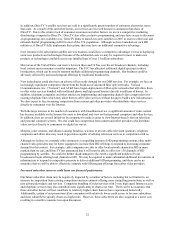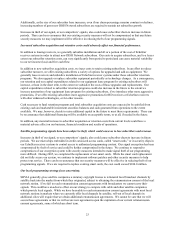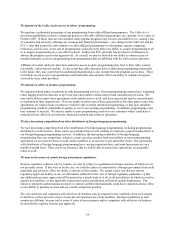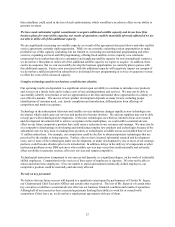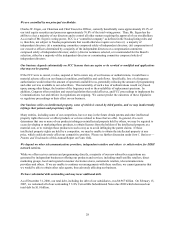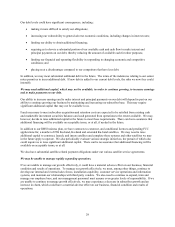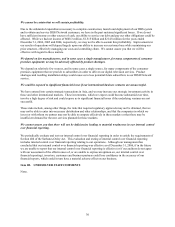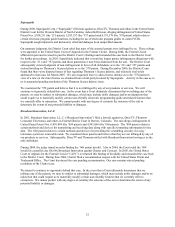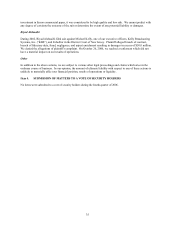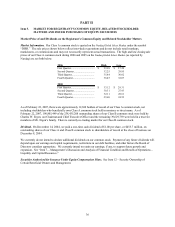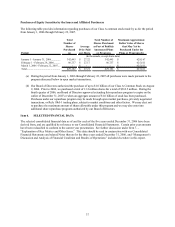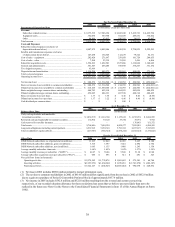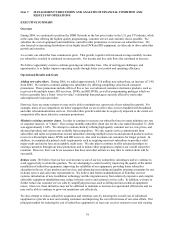Dish Network 2006 Annual Report Download - page 42
Download and view the complete annual report
Please find page 42 of the 2006 Dish Network annual report below. You can navigate through the pages in the report by either clicking on the pages listed below, or by using the keyword search tool below to find specific information within the annual report.32
Superguide
During 2000, Superguide Corp. (“Superguide”) filed suit against us, DirecTV, Thomson and others in the United States
District Court for the Western District of North Carolina, Asheville Division, alleging infringement of United States
Patent Nos. 5,038,211 (the ‘211 patent), 5,293,357 (the ‘357 patent) and 4,751,578 (the ‘578 patent) which relate to
certain electronic program guide functions, including the use of electronic program guides to control VCRs.
Superguide sought injunctive and declaratory relief and damages in an unspecified amount.
On summary judgment, the District Court ruled that none of the asserted patents were infringed by us. These rulings
were appealed to the United States Court of Appeals for the Federal Circuit. During 2004, the Federal Circuit
affirmed in part and reversed in part the District Court’s findings and remanded the case back to the District Court
for further proceedings. In 2005, SuperGuide indicated that it would no longer pursue infringement allegations with
respect to the ‘211 and ‘357 patents and those patents have now been dismissed from the suit. The District Court
subsequently entered judgment of non-infringement in favor of all defendants as to the ‘211 and ‘357 patents and
ordered briefing on Thomson’s license defense as to the ‘578 patent. During December 2006, the District Court
found that there were disputed issues of fact regarding Thomson’s license defense, and ordered a trial solely
addressed to that issue for March 2007. We also requested leave to add a license defense as to the ‘578 patent in
view of a new (at the time) license we obtained from a third-party licensed by Superguide. Activity in the case as to
us is suspended pending resolution of the Thomson license defense issue.
We examined the ‘578 patent and believe that it is not infringed by any of our products or services. We will
continue to vigorously defend this case. In the event that a Court ultimately determines that we infringe any of the
patents, we may be subject to substantial damages, which may include treble damages and/or an injunction that
could require us to materially modify certain user-friendly electronic programming guide and related features that
we currently offer to consumers. We cannot predict with any degree of certainty the outcome of the suit or
determine the extent of any potential liability or damages.
Broadcast Innovation, L.L.C.
In 2001, Broadcast Innovation, L.L.C. (“Broadcast Innovation”) filed a lawsuit against us, DirecTV, Thomson
Consumer Electronics and others in Federal District Court in Denver, Colorado. The suit alleges infringement of
United States Patent Nos. 6,076,094 (the ‘094 patent) and 4,992,066 (the ‘066 patent). The ‘094 patent relates to
certain methods and devices for transmitting and receiving data along with specific formatting information for the
data. The ‘066 patent relates to certain methods and devices for providing the scrambling circuitry for a pay
television system on removable cards. We examined these patents and believe that they are not infringed by any of
our products or services. Subsequently, DirecTV and Thomson settled with Broadcast Innovation leaving us as the
only defendant.
During 2004, the judge issued an order finding the ‘066 patent invalid. Also in 2004, the Court ruled the ‘094
invalid in a parallel case filed by Broadcast Innovation against Charter and Comcast. In 2005, the United States
Court of Appeals for the Federal Circuit (“CAFC”) overturned this finding of invalidity and remanded the case back
to the District Court. During June 2006, Charter filed a reexamination request with the United States Patent and
Trademark Office. The Court has stayed the case pending reexamination. Our case remains stayed pending
resolution of the Charter case.
We intend to continue to vigorously defend this case. In the event that a Court ultimately determines that we
infringe any of the patents, we may be subject to substantial damages, which may include treble damages and/or an
injunction that could require us to materially modify certain user-friendly features that we currently offer to
consumers. We cannot predict with any degree of certainty the outcome of the suit or determine the extent of any
potential liability or damages.


